BKMT READING GUIDES
Will in the World: How Shakespeare Became Shakespeare
by Stephen Greenblatt
Published: 2005-09-17
Paperback : 448 pages
Paperback : 448 pages
2 members reading this now
2 clubs reading this now
0 members have read this book
2 clubs reading this now
0 members have read this book
"So engrossing, clearheaded, and lucid that its arrival is not just welcome but cause for celebration."—Dan Cryer, Newsday
Stephen Greenblatt, the charismatic Harvard professor who "knows more about Shakespeare than Ben Jonson or the Dark Lady did" (John Leonard, Harper's), has written a ...
No other editions available.
Jump to
Introduction
"So engrossing, clearheaded, and lucid that its arrival is not just welcome but cause for celebration."—Dan Cryer, Newsday
Stephen Greenblatt, the charismatic Harvard professor who "knows more about Shakespeare than Ben Jonson or the Dark Lady did" (John Leonard, Harper's), has written a biography that enables us to see, hear, and feel how an acutely sensitive and talented boy, surrounded by the rich tapestry of Elizabethan life; full of drama and pageantry, and also cruelty and danger; could have become the world's greatest playwright. A young man from the provinces—a man without wealth, connections, or university education—moves to London. In a remarkably short time he becomes the greatest playwright not just of his age but of all time. His works appeal to urban sophisticates and first-time theatergoers; he turns politics into poetry; he recklessly mingles vulgar clowning and philosophical subtlety. How is such an achievement to be explained?Will in the World interweaves a searching account of Elizabethan England with a vivid narrative of the playwright's life. We see Shakespeare learning his craft, starting a family, and forging a career for himself in the wildly competitive London theater world, while at the same time grappling with dangerous religious and political forces that took less-agile figures to the scaffold. Above all, we never lose sight of the great works—A Midsummer Night's Dream, Romeo and Juliet, Hamlet, Macbeth, and more—that continue after four hundred years to delight and haunt audiences everywhere. The basic biographical facts of Shakespeare's life have been known for over a century, but now Stephen Greenblatt shows how this particular life history gave rise to the world's greatest writer. Bringing together little-known historical facts and little-noticed elements of Shakespeare's plays, Greenblatt makes inspired connections between the life and the works and deliver "a dazzling and subtle biography" (Richard Lacayo, Time). Readers will experience Shakespeare's vital plays again as if for the first time, but with greater understanding and appreciation of their extraordinary depth and humanity.
A Best Book of the Year: The New York Times 10 Best Books of 2004; Time magazine's #1 Best Nonfiction Book; A Washington Post Book World Rave ; An Economist Best Book ; A San Francisco Chronicle Best Book; A Christian Science Monitor Best Book; A Chicago Tribune Best Book; A Pittsburgh Post-Gazette Best Book ; NPR's Maureen Corrigan's Best. 16 pages of color illustrations
Editorial Review
There's no shortage of good Shakespearean biographies. But Stephen Greenblatt, brilliant scholar and author of Will in the World: How Shakespeare Became Shakespeare, reminds us that the "surviving traces" are "abundant but thin" as to known facts. He acknowledges the paradox of the many biographies spun out of conjecture but then produces a book so persuasive and breathtakingly enjoyable that one wonders what he could have done if the usual stuff of biographical inquiry--memoirs, interviews, manuscripts, and drafts--had been at his disposal. Greenblatt uses the "verbal traces" in Shakespeare's work to take us "back into the life he lived and into the world to which he was so open." Whenever possible, he also ushers us from the extraordinary life into the luminous work. The result is a marvelous blend of scholarship, insight, observation, and, yes, conjecture--but conjecture always based on the most convincing and inspired reasoning and evidence. Particularly compelling are Greenblatt's discussions of the playwright's relationship with the university wit Robert Greene (discussed as a chief source for the character of Falstaff) and of Hamlet in relation to the death of Shakespeare's son Hamnet, his aging father, and the "world of damaged rituals" that England's Catholics were forced to endure. Will in the World is not just the life story of the world's most revered writer. It is the story, too, of 16th- and 17th-century England writ large, the story of religious upheaval and political intrigue, of country festivals and brutal public executions, of the court and the theater, of Stratford and London, of martyrdom and recusancy, of witchcraft and magic, of love and death: in short, of the private but engaged William Shakespeare in his remarkable world. Throughout the book, Greenblatt's style is breezy and familiar. He often refers to the poet simply as Will. Yet for all his alacrity of style and the book's accessibility, Will in the World is profoundly erudite, an enormous contribution to the world of Shakespearean letters. --Silvana Tropea
Interview with Stephen Greenblatt  Stephen Greenblatt shares his thoughts about what make Shakespeare Shakespeare and why the Bard continues to fascinate us endlessly.
Stephen Greenblatt shares his thoughts about what make Shakespeare Shakespeare and why the Bard continues to fascinate us endlessly.
Discussion Questions
No discussion questions at this time.Book Club Recommendations
Recommended to book clubs by 0 of 0 members.
MEMBER LOGIN
BECOME A MEMBER it's free
Book Club HQ to over 90,000+ book clubs and ready to welcome yours.
SEARCH OUR READING GUIDES
Search
FEATURED EVENTS
PAST AUTHOR CHATS
JOIN OUR MAILING LIST
Get free weekly updates on top club picks, book giveaways, author events and more
Get free weekly updates on top club picks, book giveaways, author events and more
Please wait...








